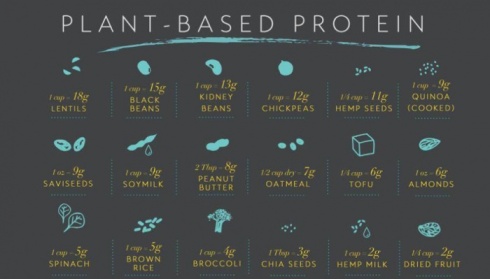
When I first began eating a plant based diet, everyone suddenly became concerned with my protein intake. That is the one nutrient that always seemed to come up. Not B12 or iron, always protein. I’m sure many other vegans experience this because, in our society, we are taught that one needs to consume animal products in order to properly fuel their bodies and get adequate protein intake. I do not fault people for thinking this way because that used to be my belief as well. Eating animal flesh is so engrained in our culture that we think it necessary to our survival. Here are some questions to consider before you eat that egg white omelette or chicken breast to get your protein after a challenging workout.
When you eat animal protein, what else are you getting?
Sure, when you eat eggs, a steak or piece of chicken you are getting a great deal of complete protein. But, what else are you getting? In addition to that protein, you are taking in a good amount of cholesterol and saturated fat. Both of which I think we can all agree are not things we want in excess in our bodies. Cholesterol and saturated fat collect in the arteries causing blockages leading to symptoms such as heart attack, stroke, macular degeneration and erectile disfunction.
Aside from taking in the animal flesh itself, you are also taking in everything that animal was given and exposed to. Antibiotics have been used in industrial farms since 1946 and currently account for 80% of the antibiotic use in the country. For the purpose of stimulating growth and keeping the animals alive in filthy conditions, antibiotics are regularly given to livestock. By eating animal flesh, you are also being exposed to these antibiotics which throw off the bacteria levels in your body.
What effects do animal proteins have on our bodies?
This topic has been studied at great lengths and we are constantly learning new information on the large role that animal products play in promoting disease within the body. Cancer specifically is promoted and fed by eating a diet rich in animal products. In one of the longest and most comprehensive studies done, the China Study, Dr. T Colin Campbell found that casein (which makes up 80% of the proteins in cow’s milk) dramatically promoted liver cancer when fed to experimental rats. Just a few years ago, the World Health Organization released a study which found that processed meats cause an increase in certain types of cancer such as prostate, colorectal and pancreatic.
Could there be a danger is consuming too much protein?
The Dietary Reference Intake of protein is 0.36 g per pound of body weight, of course this will vary a little depending on your activity level. When you consume more protein than your body needs, those calories get converted to sugar and then fat. These increased sugar levels can feed bacteria and even cancer cells.
What are some good, plant based sources of protein?
There are 9 essential amino acids that the body can’t produce on it’s own and are needed to make a complete protein. These are present in meat and eggs, which is perhaps part of the reason they’ve been believed to be a good source. However, plants contain protein as well and here are a few great complete protein sources:
~ Quinoa: 8g / cup
~ Buckwheat: 23g / cup
~ Tofu: 10g / 1/2 cup
~ Tempeh: 15g / 1/2 cup
You can see a few tempeh recipes in my Tempting Tempeh post from a while back.
Sources:
http://nutritionstudies.org/animal-vs-plant-protein/
http://www.cancer.org/cancer/news/world-health-organization-says-processed-meat-causes-cancer


Leave a comment